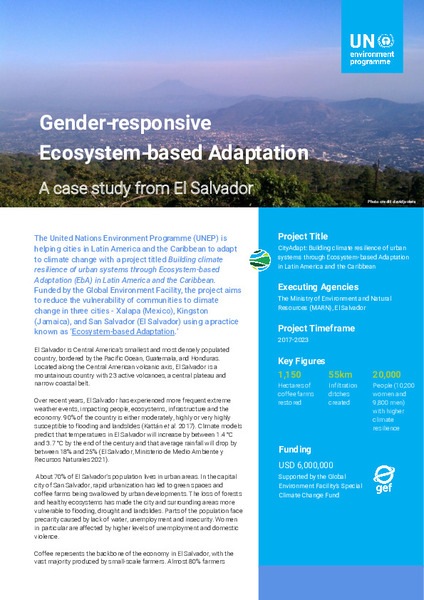| dc.contributor | Climate Change Division | en_US |
| dc.contributor.author | United Nations Environment Programme | en_US |
| dc.coverage.spatial | El Salvador | en_US |
| dc.date.accessioned | 2024-04-04T09:00:52Z | |
| dc.date.available | 2024-04-04T09:00:52Z | |
| dc.date.issued | 2024-04 | |
| dc.identifier.isbn | 978-92-807-4133-9 | en_US |
| dc.identifier.other | DEP/2623/NA | en_US |
| dc.identifier.uri | https://wedocs.unep.org/20.500.11822/45305 | |
| dc.description | Coffee represents the backbone of the economy in El Salvador, with the vast majority produced by small-scale farmers. Almost 80% farmers cultivate on small plots of less than 3.5 hectares. However, changing temperatures make growing coffee more difficult, while dependence on coffee alone leaves producers vulnerable to fluctuating prices on the global market. Increasing temperatures across coffee-growing regions in El Salvador have led to a loss of both the quantity and quality of coffee (Bravo-Ureta et al. 2022). Women represent about a third of all coffee producers in El Salvador. Women coffee producers have less access to land, resources and credit than men, limiting their capacity to earn a living and leaving them more vulnerable to the impacts of climate change. On the other hand, women have a unique relationship with nature, possessing local ecological knowledge and skills critical for climate change adaptation. | en_US |
| dc.description.uri | https://www.unep.org/topics/climate-action/adaptation/ecosystem-based-adaptation | en_US |
| dc.format | pdf | en_US |
| dc.language | English | en_US |
| dc.language | Spanish | |
| dc.publisher | United Nations Environment Programme | en_US |
| dc.relation.ispartof | CityAdapt: Building climate resilience of urban systems through Ecosystem-based Adaptation in Latin America and the Caribbean | en_US |
| dc.rights | Public | en_US |
| dc.subject | coffee | en_US |
| dc.subject | gender mainstreaming | en_US |
| dc.subject | climate change adaptation | en_US |
| dc.subject | ecosystem-based approach | en_US |
| dc.subject | poverty mitigation | en_US |
| dc.subject | water resource | en_US |
| dc.subject | El Salvador | en_US |
| dc.title | Gender-responsive Ecosystem-based Adaptation: A case study from El Salvador | en_US |
| dc.title.alternative | Adaptación basada en Ecosistemas con perspectiva de género: Un caso de estudio de El Salvador | |
| dc.type | Publications | en_US |
| dc.type | Project Reports | |
| wd.identifier.sdg | SDG 1 - No Poverty | en_US |
| wd.identifier.sdg | SDG 6 - Clean Water and Sanitation | en_US |
| wd.identifier.sdg | SDG 11 - Sustainable Cities and Communities | en_US |
| wd.identifier.sdg | SDG 13 - Climate Action | en_US |
| wd.identifier.sdg | SDG 15 - Life on Land | en_US |
| wd.topics | Climate Action | en_US |
| wd.topics | Nature Action | en_US |
| wd.identifier.pagesnumber | 5 p. | en_US |
| dc.relation.TableOfContents | Gender-responsive Ecosystem-based Adaptation in San Salvador | en_US |
| dc.relation.TableOfContents | Lessons Learned | en_US |



